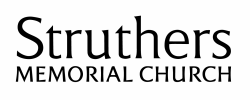|
Copyright © 2014 Struthers Memorial Church All rights reserved
Struthers Memorial Church is a registered Scottish Charity No. SC 006960 | Struthers Memorial Church is a company limited by guarantee incorporated in Scotland Company No SC335480 | Registered Office: 33 West Stewart Street, Greenock, PA15 1SH. |

 RSS Feed
RSS Feed
